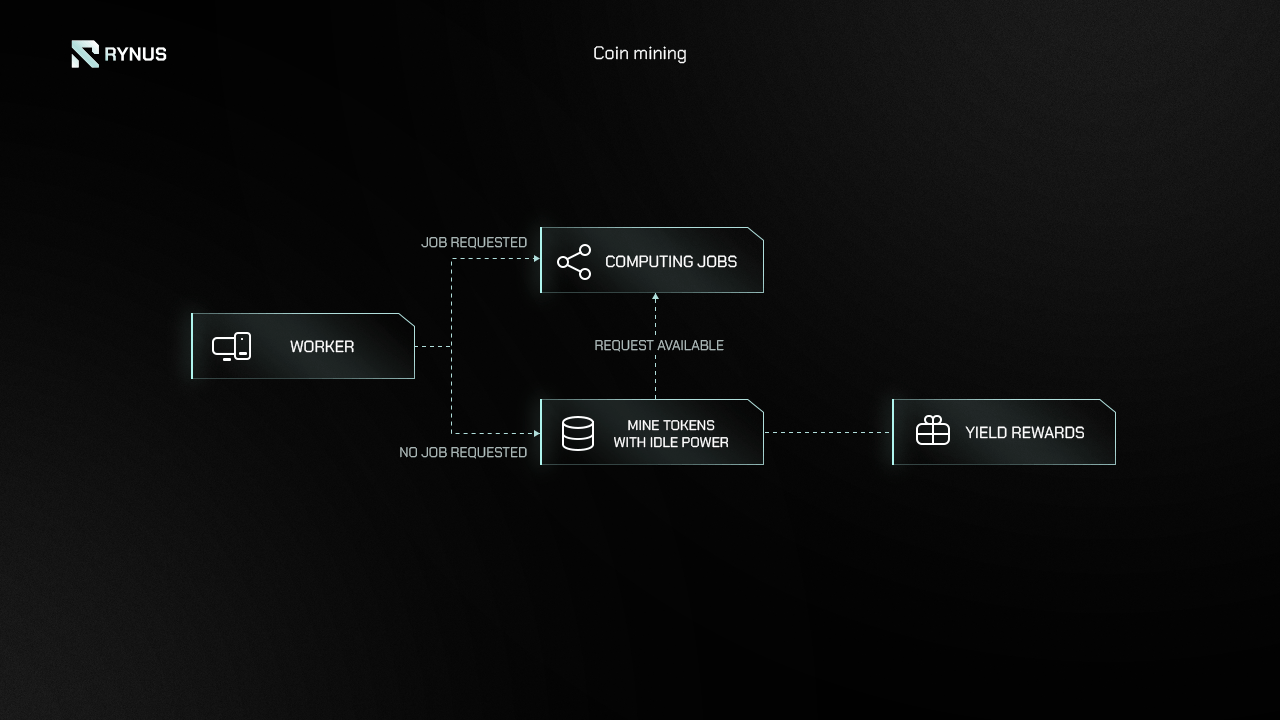A blockchain-based decentralized platform for 3D rendering and AI training, offering diversity, affordability, and optimization for monetization.
Rynus is a cloud GPU computing platform characterized by five key features.
1. Decentralised Cloud Computing Network
Rynus allows individuals and entities around the world, regardless of specialized knowledge, as long as they have unused GPUs and devices, to join and contribute resources to the network. Thus, we create a platform containing unlimited computing resources.
Rynus connects users who do AI training and 3D rendering and require GPU computing power with individuals and entities with unused GPUs worldwide. And connect users who need Data labeling service with millions of idle devices around the world.
2. For AI Training, Data Labeling, and 3D Rendering
With unlimited decentralized resources, Rynus is for AI Training, Data Labeling, and 3D Rendering. Rynus distributes AI Training, Data Labeling, and 3D Rendering jobs through a distributed network of Workers across the world, allowing the smallest AI training, data labeling, or rendering jobs to access massive computing resources.
3. Based on Solana Blockchain
Rynus integrates the Solana blockchain and provides a Proof-of-Compute system.
Those who request to perform AI training, Data labeling, or 3D rendering jobs (called Requesters) will pay those who perform the job of training AI models, labeling data, or rendering (called Workers) with Rynus Tokens. Rynus tokens are issued based on Solana blockchain technology. Solana brings transparency and security to transactions on the platform. Tokens can be stored in any Solana wallet and traded on compatible exchanges.
Rynus also uses a Proof-of-Compute system. This system saves proof of computation on the blockchain, as proof that Workers have completed training AI model, labeling data, or 3D rendering, and then awards Workers with Tokens. This system ensures that Workers’ completed results meet the Requesters’ requirements.
4. Diversity and Affordability
The Rynus platform connects a global network of spare GPU resource providers, providing unlimited GPU resources in terms of quantity, brand, and model. It is a cloud platform, thus allowing users from around the world to access and use available GPU resources without the need to purchase costly hardware or pay for high hardware maintenance costs. It also eliminates the need to rent services from high-cost centralized GPU cloud computing platforms.
Rynus offers various price tiers, enabling users to choose a tier that is suitable for their ability to pay. Additionally, we provide many different GPU brands and models, enabling users to choose a GPU that fits the requirements of each rendering or AI training project.
5. Optimizing Monetization Opportunities
Users who have GPUs sitting idle can contribute them to Rynus’s Worker system and earn Tokens. Rynus provides an app for Workers that integrates both mining and receiving 3D rendering jobs or AI training tasks from the system. Workers can earn Tokens not only from performing rendering jobs and AI training tasks but also from mining on the app itself. This is an advantage that Workers can hardly find on other platforms. With Rynus, anyone with free GPUs around the world can optimize their monetization opportunities.

Coin Mining Integration: One-click deployment to yield extra rewards
6. Decentralized Pricing Model
One of Rynus’ key features is its decentralized pricing model. In the Rynus network, GPU/CPU providers, known as Workers bid for computing jobs, setting their own prices rather than having the platform dictate them. This approach contrasts with other cloud computing services where the service provider sets the costs. The rental cost of GPU/CPU for a computing job on Rynus is determined by the Workers themselves, influenced by real-time supply and demand dynamics within the cloud computing market.
This results in cost fluctuations based on current market conditions, ensuring a more equitable and transparent pricing model. By allowing Workers to control their pricing, Rynus fosters a decentralized ecosystem where market forces dictate prices, promoting a cloud computing market that is democratic, fair, and offers greater freedom. This aligns with the principles of a decentralized and user-driven network, empowering participants and enhancing the overall fairness of the platform.